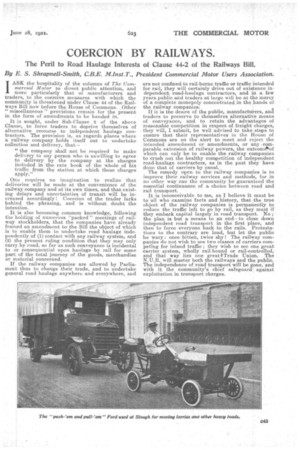COERCION BY RAILWAYS.
Page 27

If you've noticed an error in this article please click here to report it so we can fix it.
The Peril to Road Haulage Interests of Clause 44-2 of the Railways Bill.
By E. S. Shrapnell-Smith, C.B.E. M.Inst.T., President Commercial Motor Users Association.
ASK the hospitality of the columns of Tile e CoI menial Motor to direct public attention, and
more particularly that of manufacturers and traders, to the coercive measures with which the community is threatened under Clause 44 of the Railways Bill now before the House of Commons. .Other " miscellaneous " provisions remain for the present in the form of amendments to he handed in.
It is sought, under Sub-Clause 2 of the above Clause, to force traders to deprive themselves of alternative recourse to independent hauls-ge contractors. The provision is, as regards places where a railway company holds itself out to undertake collection and delivery, that—
" the company shall not be required to make delivery to any person who is unwilling to agree to delivery. by the company at the charges ineluded in therate book of the whole of his traffic from the station at which these charges apply"
One requires no imagination to realize that deliveries will be madeat the convenience of the railway company and at its own times, and that existing delays and uncertainties of transit will be increased accordingly I. Coercion of the trader lurks behind the phrasing, and is without doubt the intention.
It is also becoming common knowledge, following the holding of numerous "packed" meetings of railway stockholders, that the companies have already framed an amendment to‘ theBill the object of which is to enable them to undertake road haulage independently of (1) contact with any railway system, and (2) the present riding condition that they may only carry -by read, so far assuch conveyance is incidental to or consequential upon haulage by rail for some part of the total journey of the goods, merchandise or material concerned.
If the railway companies: are allowed by Parliament thus to change their trade, and to undertake general road haulage anywhere and everywhere, and are not confined to rail-borne traffic or traffic intended for rail, they will certainly drive out of existence independent road-haulage contractors, and in a few years public and traders at large will be at the mercy of a complete monopoly concentrated in the hands of the railway companies.
If it is the desire of the public, manufacturers, an traders to preserve to themselves. alternative means of conveyance, and to retain the advantages of reasonable competition in respect of freight charges, they will, I submit, be well advised to take steps to ensare that their representativesin the House of Commons are on the alert to meet and reject the intended amendment or amendments, or any -comparable extension of railway powers, the outcornelkof which can only be to enable the railway companies to crush out the healthy competition of independent road-haulage contractors, as in the past they have done that of carriers by canal.
The remedy open to the' railway companies is to improve their railway services and metheds, for in no other way can the community be guaranteed the essential continuance of a choice between road and rail transport.
It is inconceivable to me, as I believe it must be to'all who examine facts and history, that the true object of the railway companies is permanently to reduce the traffic left to go by rail, as they must if they embark capital largely in road transport. No; the plan is but a means to an end—to close down independent road transport in the first place, and then to force everyone back to the rails. Protestations to the contrary are loud, but let the public he wary : once bitten, twice shy! The railway companies do not wish to see two classes of carriers competing for inland traffic ; they wish to see one great carrier system, wholly rail-bound or rail-controlled, and that way lies one greattTrade Union, The N.U.R. will master both the railways and the public. The independence of road transport will he gone,and with it the community's chief safeguard against exploitation in transport charges.








































